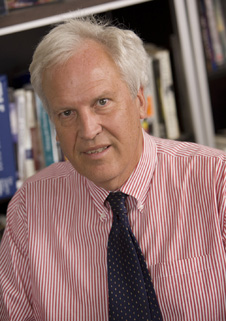3Qs: Delivering on the big story

On Sunday night, the world was captivated by news coverage of President Obama’s stunning announcement that Osama bin Laden, mastermind of the Sept. 11 attacks, had been killed by U.S. special forces after 10 years of pursuit. Steven Burgard, director of Northeastern University’s School of Journalism, analyzes what directions media questions and reports may lead from here, and the challenges journalists face in ensuring speedy but accurate reporting in the digital age.
What was your assessment of the initial news coverage?
This was a story that broke late on a Sunday night, with the White House press corps being called back around 10 p.m. The story had to be assembled quickly, and it was already reaching people by mobile phone all around the country. But actually having President Obama lend his authenticity to this story early made it a little smoother for mainstream organizations to prepare for Monday’s news cycles. From watching the morning news yesterday, I thought broadcast media reports were quite good. They had a lot of information fairly early, and they’d lined up security experts to analyze what we knew.
Where do you expect the news coverage to go from here?
We’re seeing the beginning of questions about how bin Laden was holed up in a fairly ordinary and elaborate place that was apparently built for him close to a military training facility in a suburb in Pakistan. That’s fairly significant, because I think the next round of questions will lead to more coming out about the state of relations between the U.S. and Pakistani governments, and why this raid took place without the degree of cooperation you might have expected with the Pakistani government.
Another question is about the future of our military engagement in Afghanistan. We know now that bin Laden wasn’t there, and we’re there with a mission to fight al-Qaida. So how does this news affect, in the long run, any of our military operations in that country? With the accelerated news cycles that we have now, I think those questions will come sooner.
What are the challenges facing journalists today as they balance careful reporting with the fast pace of news in the digital medium?
It’s a challenge that’s with us more now than ever before, though it has always been there. The press has always had to deal with rumor and innuendo. But generally, the mainstream press is fairly careful about going with a story before they get sources that are reliable. There are cases where this is embarrassing or makes the press appear to be slow, but you have to remember the official sources are often under the same time pressures. They recognize themselves that if they want to control the story, they need to quickly get out their version of events. They don’t have the luxury of waiting, either. That might have been part of what happened Sunday night, a feeling that it would be best for the president himself to be the source of this information as soon as possible.




